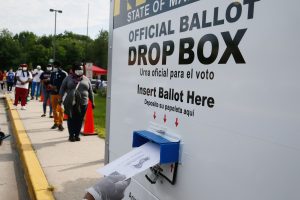 Written By: Paul R. DiPadua
Written By: Paul R. DiPadua
Last week, the Wisconsin Supreme Court outlawed ballot drop boxes in Teigen v. Wisconsin Election Commission. This four to three decision comes on the heels of the 2020 Presidential Election—an event that made election integrity and voter suppression hot-button issues among the American electorate. The barring of ballot drop boxes in Wisconsin will likely invoke a great deal of passion from both sides of the political aisle, especially as the 2022 Midterm Election rapidly approaches.
What is a Ballot Drop Box?
A ballot drop box is a secure, locked structure where voters can deposit their absentee ballots. Ballot drop boxes often resemble traditional, blue USPS post office boxes, and are even used in a similar fashion. Just as individuals place envelopes in post office boxes to mail cards or letters, voters deposit their absentee ballots in ballot drop boxes to cast their votes.
Ballot drop boxes gained prominence in the 2020 Presidential Election because of the COVID-19 pandemic. Voters nationwide were hesitant to visit physical polling locations on Election Day because they have high traffic, require touching germ-laden surfaces and objects, and, ultimately, pose a high risk of COVID-19 transmission. Ballot drop boxes offered voters a safer alternative—one that did not require interacting with a single person or touching anything. Consequently, 69% of nationwide voters cast their ballots untraditionally, i.e., utilizing methods like ballot drop boxes.
Wisconsin election officials erected 570 ballot drop boxes in 66 different Wisconsin counties to serve the needs of its citizens during the 2020 Presidential Election. However, the 2020 Presidential Election will be the last time ballot drop boxes are ever used in Wisconsin.
The Wisconsin Supreme Court’s Rationale
Wisconsin state law provides that absentee voting is a “privilege exercised wholly outside the traditional safeguards of the polling place” and “must be carefully regulated to prevent the potential for fraud and abuse.” Accordingly, Wisconsin state law has a multitude of procedures that must be adhered to when voting by absentee ballot. The Wisconsin Supreme Court outlawed ballot drop boxes because ballot drop boxes violated one of these procedures.
Per Wisconsin state law, absentee ballots must “be mailed by the elector, or delivered in person, to the municipal clerk issuing the ballot or ballots.” When issuing its decision, the Wisconsin Supreme Court focused on the prepositional phrase “to the municipal clerk.” Additionally, the Court interpreted this as meaning “to the municipal clerk’s office.”
Voters who cast their absentee ballots via ballot drop box did not deliver their ballots to the municipal clerk’s office—they delivered them to a ballot drop box. The Wisconsin Supreme Court stated that “an inanimate object, such as a ballot box, cannot be the municipal clerk.” Since ballot drop boxes are not municipal clerks or municipal clerk’s offices, absentee ballots deposited in ballot drop boxes violate Wisconsin state law. Consequently, the Wisconsin Supreme Court held that ballot drop boxes are illegal in the state of Wisconsin.
Concerns Expressed by the Dissenting Opinion
In the dissenting opinion, Justice Ann Walsh Bradley struggled to understand the rationale of the majority opinion. Specifically, there was confusion as to why “to the municipal clerk” was interpreted to mean “to the municipal clerk’s office.” The dissent correctly points out that there are numerous Wisconsin statutes that explicitly mention the municipal clerk’s office, and the statute referenced by the majority opinion is not one of them. The dissent suggests that if the intent of the statute was to have absentee ballots delivered to the municipal clerk’s office, the word “office” would be in the statute.
The dissenting opinion also could not reconcile how depositing an absentee ballot in a ballot drop box is different than delivering it to the municipal clerk themselves. The dissent reasons that a ballot drop box is an extension of the municipal clerk because it “is set up by the municipal clerk, maintained by the municipal clerk, and emptied by the municipal clerk.”
The dissenting justices were befuddled by the majority opinion’s rationale, but they were most troubled by the repercussions of this decision. The dissenting opinion asserts that outlawing ballot drop boxes will severely disadvantage the voting rights of marginalized communities. It is evident that most municipal clerk’s offices are located great distances away from disadvantaged populations and are only staffed by a single, part-time municipal clerk.
Skepticism Expressed by the Majority Opinion
Not only did Teigen v. Wisconsin Election Commission outlaw ballot drop boxes, but it also expressed skepticism towards the results of the 2020 Presidential Election. Chief Justice Grassl Bradley stated that the procedures followed during the 2020 Presidential Election were “unlawful” and the results were “illegitimate.” The Chief Justice further proceeded to compare Wisconsin’s election process in 2020 to the near-unanimous elections of dictators such as Saddam Hussein, Kim Jung-un, Raul Castro, and Bashar al-Assad. This portion of the majority opinion was so bizarre that Justice Brian Hagedorn, the swing vote of this four to three decision, declined to join.
Looking Forward to Election Season
This opinion comes at an interesting time, as Wisconsin’s primary election is less than a month away and the 2022 Midterm Election is right around the corner. Since the 2020 Presidential Election, the political issues of election integrity and voter suppression have sparked fierce debate. This decision by the Wisconsin Supreme Court will likely reinvigorate this debate, and these political issues will remain top of mind for American voters.
Sources
Mark Joseph Stern, Wisconsin Supreme Court Bans Drop Boxes, Suggests Biden’s 2020 Victory Was “Illegitimate”, SLATE (July 8, 2022, 3:30 PM).
Teigen v. Wis. Election Comm’n, No. 2022AP91, 2022 WI 64 (Wis. July 8, 2022).
Wis. Stat. § 6.84(1).
Wis. Stat. § 6.87(4)(b)(1).
Zach Scherer, Majority of Voters Used Nontraditional Methods to Cast Ballots in 2020, U.S. CENSUS BUREAU (Apr. 29, 2021).

